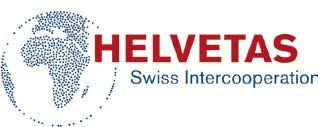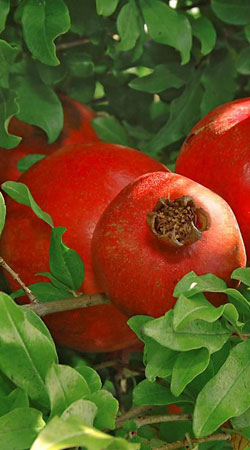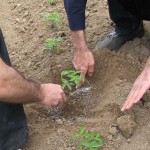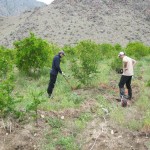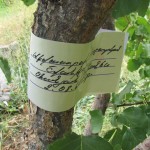20-րդ դարի վաթսունականներից երկրագնդին սպառնում է գլոբալ տաքացման խնդիրը: Գիտական մի շարք աշխատություններ են կատարվել` հասկանալու, թե արդյոք այս խնդիրը մարդածին է, թե հանդիսանում է գլոբալ փոփոխությունների տրամաբանական զարգացում: Հաշվի առնելով գլոբալ ջերմաստիճանի բարձրացումը մի կողմից, իսկ մյուս կողմից կենդանատեսակների վերացումը` էկո համակարգերի ադապտացումը այս եղանակային պայմաններին հարցականի տակ է առնվում: Գլոբալ կլիմայական փոփոխությունների առումով Հայաստանը բավականին խոցելի դիրք է զբաղեցնում` իր լեռնային առանձնահատկություններով հանդերձ: Սա չի կարող անխուսափելի հետևանք չունենալ ոչ միայն համաշխարհային գյուղատնտեսական միտումների, այլ նաև Հայաստանում գյուղատնտեսության ընդհանուր զարգացման նկատմամբ` հաշվի առնելով գյուղատնտեսության տնտեսական ներուժը և դրա ազդեցությունը երկրի համընդհանուր զարգացմանը: Ավելին, Հայաստանը, թվում է թե արդյունավետ չի գործարկում գյուղատնտեսության ներուժը` ընդհանուր առմամբ համարելով այն ոչ եկամտաբեր: Ոռոգման, մարդկային ներգրավվածության, նորարար տեխնոլոգիաների բացակայության, գյուղական համայնքներով սահմանափակված գյուղատնտեսության և այլ խնդիրների հետ զուգընթաց Հայաստանի առջև ծառացել է նաև մեկ այլ լուրջ խնդիր` արտագաղթ, իսկ արտագաղթը պայմանավորող գործոններից մեկն այն է, որ երիտասարդությունը չի դիտարկում գյուղատնտեսությունը որպես հեռանկարային զբաղմունք կամ կայուն զարգացում ունեցող բիզնես: Այդ իսկ պատճառով, գյուղատնտեսությունը շարունակում է մնալ տարեցների ձեռքերում, որոնք, թերևս, դիտարկում են այն որպես փոքրամասշտաբ զբաղմունք և չեն վարանում կիրառել մշակման՝ ավանդաբար իրենց հասած միջոցները:
«Շուկաներ Մեղրիի համար» (M4M) ծրագիրը հատուկ ուշադրություն է դարձնում Մեղրիում գյուղատնտեսության զարգացման գործում երիտասարդության ներգրավվածությանը` հաշվի առնելով այդ տարածաշրջանի աշխարհագրական և կլիմայական առանձնահատկությունները, ինչպես նաև ժամանակակից և առաջանցիկ ոռոգման համակարգի, երիտասարդների հետաքրքության բացակայությունը և որ ամենակարևորն է, տարածաշրջանի մրգի բարձր որակը և թարմությունը:
Որպես իր առաքելության անքակտելի մաս` ծրագիրը փորձում է ձերբազատվել մշակման ավանդական եղանակներից նոր տեխնոլոգիաների ներմուծմամբ, որը թվում է` միակ եղանակն է ներկայացնել գյուղատնտեսությունը որպես ոչ միայն կայուն և հեռանկարային բիզնես, այլ նաև գրավիչ և հաճելի ապրելակերպ: Ավելին, ծրագիրը հույս ունի, որ նորարարական տեխնոլոգիաները, ինչպին է օրինակ Aquasource-ը, մեծ գնահատանքի կարժանանա երիտասարդության կողմից, քանզի նորարարությունը և երիտասարդությունը անբաժանելի են այն առումով, որ երկուսն էլ ճկուն են, հարմարվող և հեշտությամբ կարող են համապատասխանել մի շարք պայմանների:
Aquasource-ը նոր սերնդի պոլիմեր է, որն ունի ներծծման և խոնավությունը պահպանելու առանձնահատկություն: Այն կլանում է ոռոգումից, տեղումներից, ցողից և մառախուղից ստացված խոնավությունը, պահպանում այն իր մոլեկուլներում և երաշտի ժամանակ բույսին ապահովում խոնավությամբ: Պոլիմերը փորձարկվել է Հայաստանի տարբեր մարզերում “Ecotechnology” ՍՊԸ-ի կողմից, որը Aqausource-ի տեղական արտոդրողն է: Միևնույն ժամանակ, յուրաքանչյուր ագարակատեր կարող է օգտագործել պոլիմերը որպես երաշտի հետ պայքարի այլընտրանքային միջոց համապատասխան վերապատրաստումից հետո: Նշենք, որ ծրագրի շրջանակներում ֆերմերների համար անցկացվել են նման վերապատրաստման դասընթացներ: Մեղրիի տարածաշրջանի երեք համայնքներից` Նռնաձորից, Շվանիձորից և քաղաք Մեղրիից, մոտավորապես վաթսուն ագարակատեր մասնակցել են վերոնշյալ դասընթացներին և ձեռք են բերել տեղեկատվական և կրթական նյութեր: Մոտավորապես հիսուն ագարակատեր ցանկություն է հայտնել պոլիմերը փորձարկել իրենց այգիներում: Արդյունքում, ագարակատերերն ուղղակի զարմացել էին, թե ինչ հսկայական տարբերություն է նկատվում այն ծառերի միջև, որոնց համար օգտագործվել էր պոլիմերը և այն ծառերի, որոնք շարունակում էին բնական պայմաններում ոռոգվել: Սարգիս Քառյանն Ալվանքից այն ագարակատերերից է, ով ցանկություն է հայտնել փորձարկել պոլիմերը` չնայած ունեցած կասկածամտությանն այս նոր տեխնոլոգիայի նկատմամբ.
– Պլանավորում էի մի քանի շաբաթով արձակուրդ գնալ, դրա համար ջրեցի այգիս: Տասնհինգ օր հետո վերադարձա: Ապուշ էի կտրել, երբ տեսա այն,ինչ տեսա. բոլոր ծառերս թոշնել էին` բացի այն ծառերից, որոնց պոլիմեր էինք ներարկել: Էդտեղից մի բան հասկացա, որ պոլիմերով ներարկված ծառերը հինգից յոթ օր ավելի երկար են դիմանում, քան ուղղակի ջրածները:
Սարգիսը ցանկություն հայտնեց պոլիմերն օգտագործել հետագայում ծառերի իր լավագույն տեսականու համար` միևնույն ժամանակ ավելացնելով ծառերի քանակը:
– Անչափ գոհ եմ ծրագրից այս տեխնոլոգիան մեզ ներկայացնելու համար, այլապես մեր մտքով անգամ անցնել չէր կարող որ նման բանն ուղղակի հնարավոր է, ուր մնաց թե օգտագործեինք:
Եվ չնայած այս անհատական հաջողության փորձն արդեն գրանցված է` ըստ “Ecotechnology” ՍՊԸ-ի ավագ փորձագետի. «Ընդհանուր ազդեցությունը կարելի է տեսնել միայն մեկ տարի անց, երբ ծառի արմատները ամբողջությամբ կներաճեն պոլիմերի հետ, և խոնավության կլանումն ավելի արդյունավետ կիրականացվի» :
Երիտասարդների ներգրավվածությունը ավելի խթանելու համար, ծրագիրն Ագրոբիզնեսի ուսուցման կենտրոնից ընդունեց պրակտիկանտների, որոնք իրենց անմիջական մասնակցությունն ունեցան ներարկման գործողությունների ժամանակ: Իմիջիայլոց, սա նրանց` ագարակատերերի հետ նման նորարարական ծրագրերի իրանակացման առաջին փորձն էր: Երիտասարդ պրակտիկանտների ներգրավումը, թերևս, միտված էր ոլորտի երիտասարդ մասնագետների և ֆերմերների միջև համագործակցության հարթակ ստեղծելու: Ավելին, երիտասարդ մասնագետները օրինակելի էին գյուղական համայնքներում ապրող իրենց հասակակիցների համար: Այդ իսկ պատճառով այս նոր տեխնոլոգիան ողջույնի արժանացավ ոչ միայն պրակտիկանտների, այլև տեղի երիտասարդ ագարակատերերի կողմից: Այս նորամուծությունը իրականում մեծ հետաքրքրություն առաջացրեց երիտասարդների շրջանում գյուղատնտեսության ժամանակակից զարգացման նկատմամբ:
Պրակտիկանտներից մեկը` Արտաշես Ալեքսանյանը, նշում է.
– Մեզ այնքան էր հուզել այն հանգամանքը, որ մենք առաջիններից էինք Aquasource-ը կիրառելու գործում, մեծ ավյունով էինք մասնակցում ներարկմանը: Գիտեք ինչ զգացողություններ ունեինք. թվում էր, թե ինչ-որ հայտագործությանը շունչ էինք տալիս: Ավելի մեծ հատուցում էինք ստանում, երբ մեր աշխատանքի արդյունքներն էինք տեսնում, որովհետև Aquasource-ը խոնավությունը կլանելու և պահպանելու շատ եզակի միջոց է, որն ստիպում է, որ ծառը ինքն իրեն ոռոգի տեղումների բացակայության և տապի ժամանակ: Ուղղակի մեծ ուրախությամբ էինք արթնանում ամեն առավոտ` իմանալաով, որ գնում ենք ներարկումներ կատարելու մի նոր այգում, նոր շունչ հաղորդելու ևս մեկ ծառի, զրուցելու տեղի երիտասարդների հետ, որոնք ուղղակի պատկերոցում չունեին, որ ծառը կարող է, այսպես ասած, ինքն իրեն ջրել:
Պրակտիկանտներն իրենց գոհունակությունն արտահայտեցին առ այն, որ ծրագիրն իրենց հնարավորություն տվեց հասկանալ, որ գյուղատնտեսությունը, բացի ծանր աշխատանք լինելուց, կարող է նաև հաճելի զբաղմունք դառնալ: Նրանք հույս են տածում, որ իրենց հաջողվել է սեփական ավյունն ու եռանդը փոխանցել տեղի երիտասարդներին, որոնք ուսուցողական աշխատանքներին իրենց անմիջական մասնակցությամբ ձեռք բերեցին անհրաժեշտ գիտելիքներ:
Պոլիմերի փորձարկումը այժմ վերահսկվում և մշտադիտարկվում է «Շուկաներ Մեղրիի համար» ծրագրի կողմից, որի հիմնանպատակներից է ավելի շատ ագարակատերերի ներգրավել Aquasource-ի կիրառման, գնահատման և դրա ծախսերի, շահույթի և հասանելության հետ կապված աշխատանքներում: «Շուկաներ Մեղրիի համար» ծրագիրը հատուկ շեշտադրում է կատարում երիտասարդների ներգրավվածությանը, որոնք գյուղատնտեսությունը կընկալեն և կգործարկեն նորովի:









